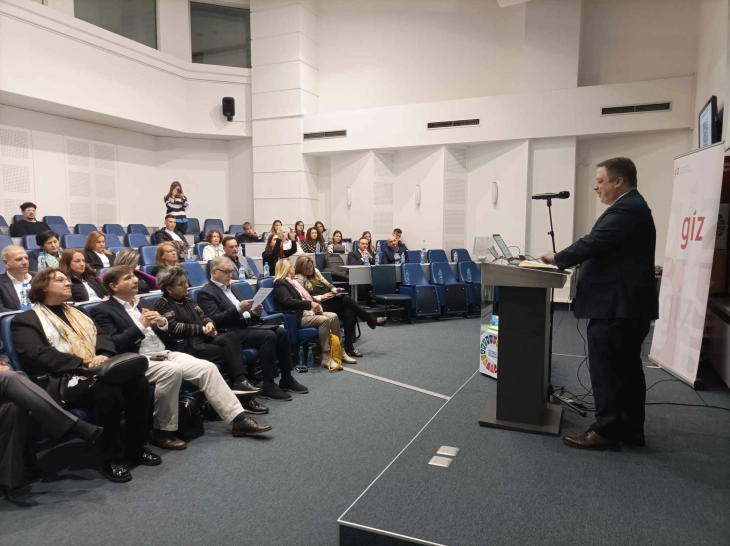Wine industry conference: Can't sell in the 21st century what you sold in the '80s
- A quality product requires knowledge and work; wine producers can't sell in the 21st century what they sold in the '80s – they need to meet standards and create a recognizable brand with a protected designation of origin, according to participants of the Wines of Macedonia regional wine conference organized with the support of the German Agency for International Cooperation.

Skopje, 20 February 2024 (MIA) — A quality product requires knowledge and work; wine producers can't sell in the 21st century what they sold in the '80s – they need to meet standards and create a recognizable brand with a protected designation of origin, according to participants of the Wines of Macedonia regional wine conference organized with the support of the German Agency for International Cooperation.
According to Wines of Macedonia association president Svetozar Janevski, the local wine industry needs to be reinvigorated through a shared vision for the future and better cooperation.
"We have to do most of the work ourselves," Janevski said, noting that the global wine market had set standards based on scientific facts, which needed to be followed in order to break into that market.
"Improvisations are a thing of the past. We can't improvise today and sell in the 21st century what we sold in the '80s. Yes, we have quality land, sunhine and grapes like nowhere else, but this needs a lot of work. We have to do the work," Janevski said, adding that the wine business also required great knowledge, both regarding vineyard management and modern technology.
He said it was hard to make changes until people were sure of what they were doing.
"We are set in our ways," Janevski said. "But they say, 'If you don't notice the changes and remain waiting at the bus stop when the bus route has changed, you won't get anywhere.' We still don't have the right approach or a vision of how to change and where we should go. Although this association was created to unite and raise Macedonia to the level of a wine country, we still don't have the unity and the approach to do this."
As a reason for this, he pointed to wine producers' inertia and government institutions' lack of support.
"Since populism reigns in our country – winning political points – we still don't have the right approach and the will to change. For us in the wine sector, reforms essentially mean a radical change," he said.
Janevski, who also chairs Tikvesh Winery's management board, said Tikvesh had been steadily working on making changes, including digging up vineyards not giving quality yields, changing viticulture management ways, and meeting standards to break into the global market.
"For the past 22 years, we have been negotiating with wine growers on how to change them. About two and a half years ago, we succeeded in gathering a group of winegrowers who agreed to work according to these standards. When they saw the final product, they came to tell me, 'Even my grandfather couldn't produce this'," Janevski said.

The German Embassy's agricultural attaché for North Macedonia Frank Müller said dialogue with regional producers needed to be encouraged. He said Western Balkan countries needed to strengthen their cooperation, implement marketing campaigns, and introduce better agricultural policies.
"Until 2007, the wine market was growing, but then the banking crisis changed this," Müller said.
"The coronavirus pandemic, wars, financial crises also led to changes. The term 'competitive' is more than correct, but we need to talk about a 'highly competitive' market where you have to make clear decisions if you want to be break into it."
"The message is that you should look for markets that are right for your products, and also take into account the structural excess of the wine scene," he said.

Wines of Macedonia executive director Elena Mladenovska Jelenkovikj discussed the latest developments in the regional trade in grapes and wine in the Western Balkans.
She stressed the need of establishing a common wine brand with a protected designation of origin as one of the key prerequisites for increasing the recognition of local wines by consumers in the EU markets and beyond.
In addition to addressing various challenges and opportunities in breaking into the global wine market, the goal of the Wines of Macedonia conference was to promote the idea of establishing a Macedonian wine brand with a protected designation of origin. mr/







